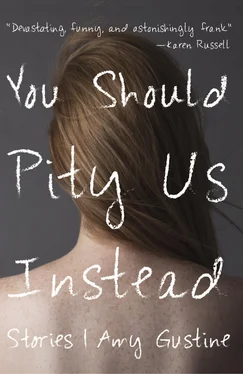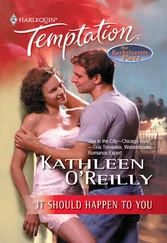“Really?” her mother would ask, lightly knuckling the top of her head. “Five pounds? That’s a lot of rice.”
On the days her mother slipped away Sarah would eat it for lunch and dinner with big pads of butter and lots of salt. When they ran out of butter she’d put on ketchup or mayonnaise, and when her mother returned after a night or two, sometimes three, fuzzy-eyed and penitent, Sarah would make twice as much, then her mother would take a bath and Sarah would sit on the toilet and tell funny stories, or ask lots of questions, vainly trying to keep her awake. When she drifted off, Sarah drained the water and covered her with towels.
•
Sarah teaches Bea how to work the cordless phone and about 911. “It’s only for emergencies, if there’s a fire or Grayson chokes.”
The notion of confronting the world alone unsettles Bea. “You can call.”
“What if I’m not here?”
“Then Mommy or Daddy will call.”
“What if Mommy and Daddy aren’t home?”
“Then I’ll be with Grandma, or Aunt Lydi.”
“Someday you’ll be alone.”
“I will?”
“Everybody is. You have to keep your wits about you.”
“What are wits?”
Sarah puts the girl on her lap. “Your smarts, your thinking. You can take care of yourself, Bea. You just have to learn some stuff.”
“I don’t want to learn stuff. I want you to do it.”
“And what if something happens to me?”
“What is going to happen?” Bea starts to cry, little hiccuping bursts that tighten Sarah’s throat.
“You need to toughen up.” She lifts Bea off her lap and gives her a light swat on the butt. “There’s nothing even wrong right now. What are you crying about?”
Sarah lives in an efficiency apartment in a complex off Bancroft Street. The Saturday after Thanksgiving she is watching reruns on TBS while the microwave blasts away at leftover spaghetti when a thunderstorm comes up, rain beating the single-paned windows. Sarah has always liked storms, so she takes her dinner and stands watching the lightning, feeling the thunder through her slippered feet. Then, a cracking noise reaches through and before she knows what is happening out there in the dark, Sarah drops her plate, covers her head, and her knees skid across the carpet, the cold air and rain on her. When the cracking noises have stopped, she looks up to see an oak tree suspended above her bed.
“My God, that’s terrible,” Melanie says. “Where did you go?”
“I checked into a motel.”
“A motel? Really? Don’t you have a friend or somebody to stay with?”
Sarah shrugs, embarrassed. She attended seven schools after she was taken from her mother. Kids’ names surface. Amber. Tanya. Ricky. Pat. Julie. She doesn’t know where any of them are now. That was Sarah’s life. One day she was sharing a toothbrush holder with you, the next she never saw you again.
“Do you have renter’s insurance?” Melanie persists. “Maybe it covers motel.”
“No, actually my mom said I shouldn’t bother. My stuff, it was so cheap. Not worth the premium.” It was actually Nancy who said this. In her delicate way, with a tilt of her head and a sad smile, the way Nancy said everything.
“What about your lease? Do you have to honor it?”
“I don’t know.”
Before she can stop her, Melanie gets the Judge on the phone. “Dad, yeah, I have a legal question.”
Sarah has nothing to worry about. The Judge says she will definitely be able to break her lease.
Melanie insists she stay with them until she finds a new place to rent, but the fourth bedroom is crowded with a huge desk and two bookcases, so she’ll have to sleep with Bea.
“Do you want the top or the bottom?” Bea asks.
Bunk beds make Sarah feel as if she’s in a coffin, so she takes the mattress off and sleeps on the floor, tells Bea it’s like a magic carpet. Of course Bea wants her mattress on the floor too, and they sleep like that, side by side, flying all night.
•
Evil . That is the word Sarah finds in the blog about Judge Cuppernell taking away Reginald Diglio’s grandchildren. It appears entry after entry. One hundred thirty-eight times. Sarah counts. She finds a news article from five years ago profiling Diglio, who at the time was circling the courthouse in his pickup truck from eight a.m. to five p.m., Monday through Friday, protesting the placement of his grandchildren in foster care. He had a sign mounted in the truck’s bed. “Cuppernell took my kids.” The picture of the sign shows a poster board with slanting, furry-edged letters that had bled, from some sort of homemade stencil she guesses, and Sarah feels an upwelling in her throat. The tears surprise her. Yes, yes, she thinks. He took away your kids.
But the article itself is like reading a blank wall. Simple facts. Only one is useful: Reginald Diglio lives on Mester Road, a two-lane stretching from the western edge of the city into the country, where houses give way to cornfields and scrapyards.
It takes more than an hour to bike there. Sarah’s legs are used to it though, and it’s a warm day for early December in Ohio. Sunny, high forties. She’s feeling strong and optimistic when she enters the last stretch and the signs change over, white with fat black numbers: County Route 24. Half a mile later three giant children’s faces come into view.
Sarah stops across the road. The sign is enormous, wider and taller than either of the rusted trucks sinking into the yard. Superimposed on the kids’ smiles are foot-high letters: “judge cuppernell took my grandchildren.” The rest of the yard is cut into rows by dozens of white paint buckets with metal pipe cemented inside and a piece of plywood lashed to the top displaying a name. Headstones for pets, perhaps. Rudy. Polly. Iris. Tim. Between the rows are other metal, plastic and wooden things intended, she assumes, as sculpture. Behind them stands a dilapidated two-story wooden house. One side disappears into a thicket under which Sarah glimpses what appear to be a mattress and couch slowly rotting.
For five or six minutes she takes in each sculpture, their menacing shapes, like bodies mid-attack, until the front door flies open. Someone shouts, words lost to her as she gets her feet on the pedals, fumbles, turns her tire onto the grass, slides, regains her grip and pedals off, heart like a crack of thunder against her ribs.
“The other kids sense something’s off. It’s because he’s angry all the time. Abused kids are always angry.” Sarah overhears Melanie saying this to someone on the phone.
She has come home mid-conversation, Bluetooth earpiece in place, waved to the kids and Sarah in the sunroom and slid into the kitchen. Sarah strains to hear the rest of the conversation while helping Beatrice finish a Lego princess castle.
“So he walked home today, and I watched out the window. He’s always alone, always, then today these other kids ran up to him and for a second I thought he’d made friends, you know? Then suddenly he slaps one of them across the face. They all stopped, but Ethan never even paused. Just kept walking. There’s something wrong there, don’t you think?”
Melanie’s voice is hard. “I’m sure it’s his mother. I talked to her. She doesn’t care. Too busy with her boyfriend, or her bongs, or something.
“Believe me, I know,” she says, in a tone that makes it sound as though whomever she’s talking to may be questioning how she can be so sure. “She’s skinny, too skinny.”
Melanie considers being too skinny the same thing as being too fat: suspect. “Drugs,” she says. “Maybe alcohol, but I bet drugs.”
A few days before Christmas, Melanie asks about Sarah’s plans. “I take it you aren’t going to Florida? Is your mother coming here?”
Читать дальше












